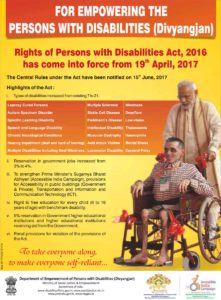Indian States and Rights of Persons with Disabilities Act, 2016
What is the news?
- A study conducted by the Disability Rights India Foundation (DRIF) on the implementation of the Rights of Persons with Disabilities (RPWD) Act, across 24 States, has revealed that more than half of the states have not notified the State rules, despite a significant lapse of time.
- Ten States, including Bihar, Manipur, Meghalaya, Odisha, Telengana, Tamil Nadu and West Bengal, have notified the State rules, the survey said.
- The study, conducted in collaboration with the National Centre for Promotion of Employment for Disabled People (NCPEDP) and National Committee on the Rights of Persons with Disabilities (NCRPD), said the Act, passed in December 2016, should have been notified by all States within six months.
- The study, which concentrated on the States’ administrative machinery with respect to the Act, found that nearly 80% of the States had not constituted the funds for implementation of the RPWD Act.
What is the Rights of Persons with Disabilities Act, 2016?
- The Rights of Persons with Disabilities Act, 2016, repealed the old Disability Act, 1995, and ushered the Indian disability movement into a new age, where disability itself will be defined based on an evolving and dynamic concept.
Salient features of the Act
 Disability has been defined based on an evolving and dynamic concept.
Disability has been defined based on an evolving and dynamic concept.- It increases the number of recognised disabilities from 7 to 21.
- Now individuals with at least 40% of a disability are also entitled to benefits such as reservations in education and employment, preference in government schemes and others.
- As per the act every child with benchmark disability between the age group of 6 and 18 years shall have the right to free education.
- As per Act, the government has a two-year deadline to ensure persons with disability get barrier-free access in all kinds of physical infrastructure and transport systems.
- It recognises the need for reservation for them in promotion and makes special mention of the rights of disabled women and children.
- A penalty will also be slapped for violating the rules of the Act.
- Special Courts will be designated in each district to handle cases concerning violation of rights of PwDs.

 Disability has been defined based on an evolving and dynamic concept.
Disability has been defined based on an evolving and dynamic concept.